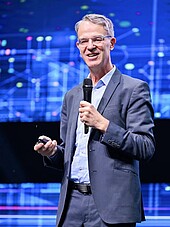Quite a few alumni of the Ludwigshafen University of Business and Society end up at SAP. One of them is Clas Neumann (born 1967), who made it into top management at the software giant after graduating from the East Asia Institute in the mid-1990s. As part of the Senior Executive Team, Clas Neumann can now look back on a successful 30-year career at SAP. He has spent many years in the fast-growing Asian markets to build up the organization, more than 20 of them in India and China. Today, he is Senior Vice President and Head of the Global SAP Labs Network.
Known for his business successes in Asia, Clas Neumann frequents high-level business circles - including chairing the German Chamber of Commerce East China - and is a valued consultant and speaker, for example at the World Economic Forum and top universities. He has also (co-)authored several books and articles on innovation and business practice in emerging markets. He lives with his family in Shanghai, China.
What fascinates you so much about Asia, Mr. Neumann?
Clas Neumann: Asia has basically been an up-and-coming region for decades. This goes hand in hand with great dynamism and an optimism among the people that is infectious. I also like the fact that most Asians are very tech-savvy and like to try out new things. You simply don't stand still here!
Was the foundation for this laid during your studies at the East Asia Institute at Ludwigshafen University of Applied Sciences?
The Marketing East Asia (China) course was actually my first real contact with Asia. During my studies, I spent every semester break backpacking all over Asia, from India to Indonesia.
What made you decide to study at the university in Ludwigshafen?
The fascination of being able to study something that hardly anyone knew at the time, let alone studied. The degree programs were still new, there were no graduates yet, so reputation or career opportunities didn't play such a big role.
What do you remember in particular when you think back to your student days?
Highlights were the visits from interesting people from business or politics to our degree programs. You took a lot away from that. It was probably the faculty with the most practical relevance and lots of exciting stories. I am still in contact with my professor of Chinese law at the time (Dr. Stricker-Kellerer). And of course I will never forget the year I spent at Yunnan University.
You graduated from the East Asia Institute in 1995 with a degree in business administration with a regional focus. How did you end up in IT?
SAP was looking for someone who could help bring our software to market in China. It was mainly about which business processes the software had to master. I applied for this position - programming was my hobby at the time and I had taught myself three programming languages as a self-taught programmer. Together with my business studies at LU University of Applied Sciences and my focus on China during my studies, it was a perfect fit.
How should we imagine your everyday life as Senior Vice President and Head of the Global SAP Labs Network?
There is no such thing as "everyday life" for me. I look after 21 SAP Labs, which are SAP's software development sites. There are SAP Labs on five continents, in Asia we make software in China, India, Japan, South Korea and Singapore. In total, we employ around 40 percent of our company's software developers in Asia. In such a large network, there is always something "happening", there are big challenges to manage, there are fascinating new developments, but also crises to overcome. It's a super interesting job that inspires me every day.
What skills from your studies are of particular benefit to you?
My studies are the "basic training", and that was very good. Sometimes I negotiate contracts, so a few basics of the international legal system help. Or it's about budgets, taxes, the P&L account - it's good to know a bit more about these terms than just being able to spell them. Other things you learn on the job, such as strategy development or designing scenarios.
Have you been in contact with your "old" university since your Degree?
I gave the alumni eulogy for the 20th anniversary of the Marketing East Asia degree programs. Prof. Manuel Vermeer also invited me to his lectures a few times to report on my practical experience in China.
What advice would you give today's students?
Learning never ends. We all keep on learning, on the job of course, but also in structured additional training courses. I myself did an MBA at INSEAD Business School ten years after my degree in Ludwigshafen. And another ten years later I did a doctorate. I've never regretted it and I've learned a lot.
It's also important to always be open to change and to do things outside your comfort zone. When I went to India, I had exactly one day to think about it with my wife - and then I said "yes". It would certainly have been easier to say "Oh, we've just built a house in the Palatinate - we can't leave"; but we sold up and threw ourselves into the adventure. In the end, we were there for twelve years and I spent some of my best and most fascinating professional years there.
Thank you very much for talking to us!
Interview: Britta Käufer



